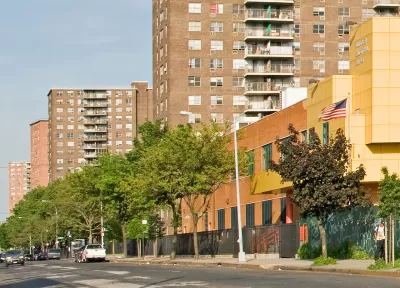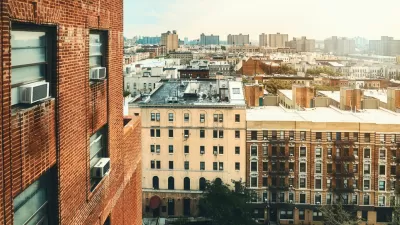Even if the money for repairing New York City's public housing were to materialize, it would be money poorly spent, according to this editorial.

An editorial by Crain's New York Business makes the argument that it makes more sense to raze New York City Housing Authority properties (i.e., the projects) and build new than it does to repair the existing properties.
To bring New York City Housing Authority properties to a state of good repair would cost $31.8 billion, according to an assessment released last month. That is 23 times greater than the agency's capital budget and more than 100 times the federal capital funding it gets in a year. The city won't allocate that kind of money, which is as much as it costs to operate the entire Police Department for five years. Albany has pledged $550 million, less than 0.2% of what's needed.
But even if $31.8 billion fell from the sky, patching up Nycha's 326 projects and 176,000 apartments would waste money and human potential.
The argument made by the editor's of Crain's appeals to the purely rational (i.e., money would be saved in the long run) and the political (i.e., "no politicians are held accountable, and the system needs to be rebuilt along with the buildings).
FULL STORY: Knock down the projects and bring in the cranes

Alabama: Trump Terminates Settlements for Black Communities Harmed By Raw Sewage
Trump deemed the landmark civil rights agreement “illegal DEI and environmental justice policy.”

Planetizen Federal Action Tracker
A weekly monitor of how Trump’s orders and actions are impacting planners and planning in America.

Why Should We Subsidize Public Transportation?
Many public transit agencies face financial stress due to rising costs, declining fare revenue, and declining subsidies. Transit advocates must provide a strong business case for increasing public transit funding.

Judge Orders Release of Frozen IRA, IIJA Funding
The decision is a victory for environmental groups who charged that freezing funds for critical infrastructure and disaster response programs caused “real and irreparable harm” to communities.

‘Clybourne Park’ Sets Stage for Housing Equity Discussions
Clybourne Park, a play exploring race, real estate, and community tensions, can set the stage for discussion on the lasting impacts of housing discrimination, gentrification, and the fight for affordability.

Understanding Road Diets
An explainer from Momentum highlights the advantages of reducing vehicle lanes in favor of more bike, transit, and pedestrian infrastructure.
Urban Design for Planners 1: Software Tools
This six-course series explores essential urban design concepts using open source software and equips planners with the tools they need to participate fully in the urban design process.
Planning for Universal Design
Learn the tools for implementing Universal Design in planning regulations.
Caltrans
Smith Gee Studio
Institute for Housing and Urban Development Studies (IHS)
City of Grandview
Harvard GSD Executive Education
Toledo-Lucas County Plan Commissions
Salt Lake City
NYU Wagner Graduate School of Public Service





























